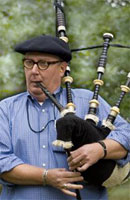|
 |
| Teachers.Net Gazette Vol.6 No.4 | April 2009 |
Subscribe for free home delivery |
|
Multiple Working Hypotheses “If the horse you’re riding dies,” goes the old maxim, “get off.” | ||
| by Todd R. Nelson Regular contributor to the Gazette April 1, 2008 |
||
|
 “Multiple working hypotheses is what we really study,” Mike would say, during our candid explorations of curricular “what ifs.” Mike sought ways to help kids link academic subjects, examine real-world problems, synthesize ideas and identify patterns in information. Best of all, he would simply ask ‘why?’ “Since everything is inter-connected, why shouldn’t students study things as they are,” he philosophized? His approach connected young minds with the cycles and patterns of the ‘real’ world. It worked. He was a “guide on the side”—a favorite teacher and an effective teacher. He brokered a conversation between his students and the scientific facts and his influence went beyond the boundaries of mere science class, making his students powerful learners, prepared for a stimulating life of working on hypotheses. | ||
|



 Todd R. Nelson has been a public and private school English teacher and administrator for 29 years, in schools in Cambridge, San Francisco, Chicago and Maine. He is principal at the Adams School in Castine, Maine, a 54 student K-8 school on the town common in a little town on the coast, where he gets to play four-square at recess, play his bagpipes, and write musicals for the all-school play.
Todd R. Nelson has been a public and private school English teacher and administrator for 29 years, in schools in Cambridge, San Francisco, Chicago and Maine. He is principal at the Adams School in Castine, Maine, a 54 student K-8 school on the town common in a little town on the coast, where he gets to play four-square at recess, play his bagpipes, and write musicals for the all-school play.